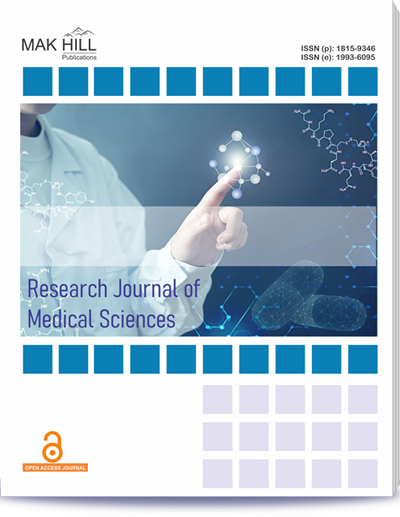
Research Journal of Medical Sciences
ISSN: Online 1993-6095ISSN: Print 1815-9346
Abstract
Gallbladder wall thickening is a common finding in sonographic evaluations, historically associated with primary gallbladder disease. However, it is now recognized as a non‐specific sign indicative of both gallbladder and systemic diseases. Ultrasound is the preferred modality for initial evaluation due to its real‐time imaging, cost‐effectiveness and portability. This study was conducted at the Department of Radiology and Imaging, Gadag Institute of Medical Sciences, from November 2019 to April 2021. Participants included patients with abdominal pain, right upper quadrant tenderness, obstructive jaundice and suspected gallbladder diseases. Patients with non‐right upper quadrant pain, acute abdomen from other causes, and post‐cholecystectomy cases were excluded. Dual‐probe ultrasound (8‐5 MHz and 12‐3 MHz) evaluated the gallbladder in sagittal and transverse planes, employing a subcostal oblique view for enhanced visualization. An 8‐hour fasting protocol was mandatory to avoid pseudo‐thickening. Evaluation criteria included wall thickness (>3.5 mm), echogenicity, margins, sonographic Murphy’s sign, vascularity (Doppler) and posterior acoustic shadowing. The sample size was 504 cases, with maximum incidence in the 4th decade, followed by the 2nd and 3rd decades. Acute cholecystitis (165 cases) showed wall thickness >5 mm in 55%, pericholecystic fluid in 100%, and positive Murphy’s sign in 77%. Chronic cholecystitis (18 cases) had wall thickness of 2‐3 mm, with associated sludge in 22% and gallstones in 33%. Polyps (120 cases) presented with wall thickness of 3.5‐10 mm, with associated gallstones in 18%. Emphysematous cholecystitis (4 cases) revealed the presence of gas within the wall. Gallbladder carcinoma (7 cases) demonstrated wall thickness >10 mm and infiltration into surrounding organs. Diffuse thickening from systemic diseases, such as cirrhosis, hepatitis and pancreatitis, was also observed. Gallbladder wall thickening has diverse etiologies, including primary gallbladder diseases and systemic conditions. Accurate diagnosis requires correlating sonographic findings with clinical and laboratory data to avoid unnecessary surgical interventions. This study underscores the importance of a comprehensive diagnostic approach to gallbladder wall thickening, enhancing the diagnostic acumen of clinicians and improving patient outcomes.
How to cite this article:
Holebasu , Bharat M. Jain, Abisha Talniya and Sai Shanmukh Vemparala. Gallbladder Wall Thickening: A Sonographic Evaluation.
DOI: https://doi.org/10.36478/10.36478/makrjms.2024.7.474.481
URL: https://www.makhillpublications.co/view-article/1815-9346/10.36478/makrjms.2024.7.474.481